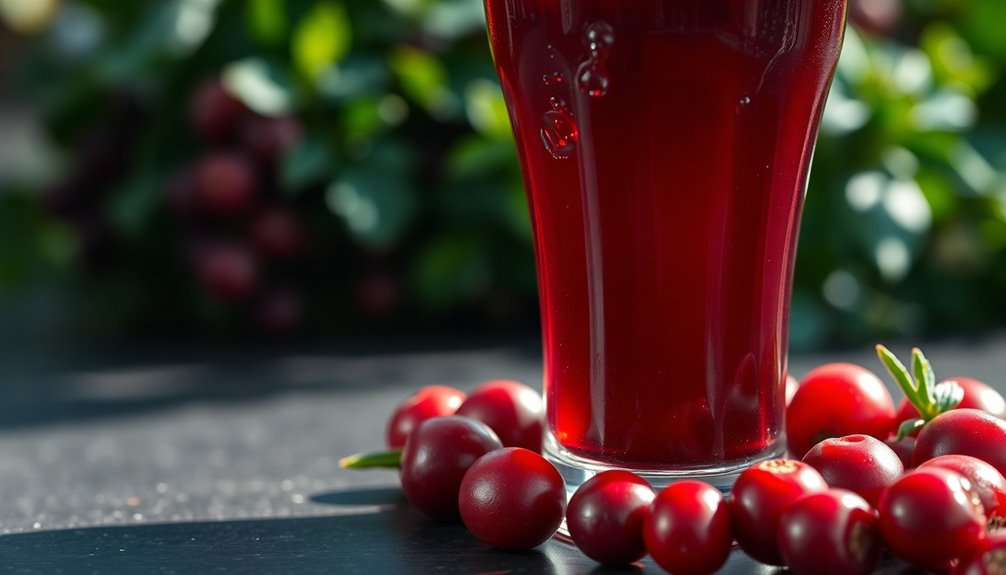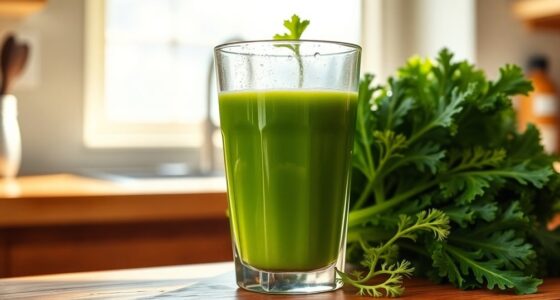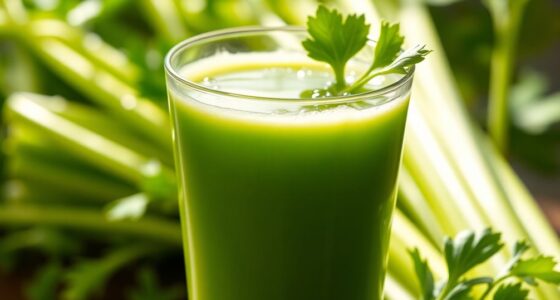Cranberry juice has mild diuretic properties, but it isn't a foolproof method for managing fluid retention. While it may help with some urinary health aspects, its effectiveness as a diuretic is limited compared to other options. Plus, cranberries are rich in antioxidants that offer various health benefits. If you're curious about how cranberry juice interacts with your health and what experts recommend, you'll find more insights ahead.
Key Takeaways
- Cranberry juice has mild diuretic properties but is not as effective as other natural diuretics like dandelion or parsley.
- Health professionals advise against relying on cranberry juice for managing fluid retention due to potential electrolyte imbalances.
- While cranberry juice may help prevent urinary tract infections, it is not a treatment for active infections.
- Excessive consumption of cranberry juice can lead to gastrointestinal issues and interact with medications like warfarin.
- Future research will explore cranberry juice's effects on urinary health and cardiovascular benefits, emphasizing its antioxidant properties.
Understanding Diuretics: What They Are and How They Work
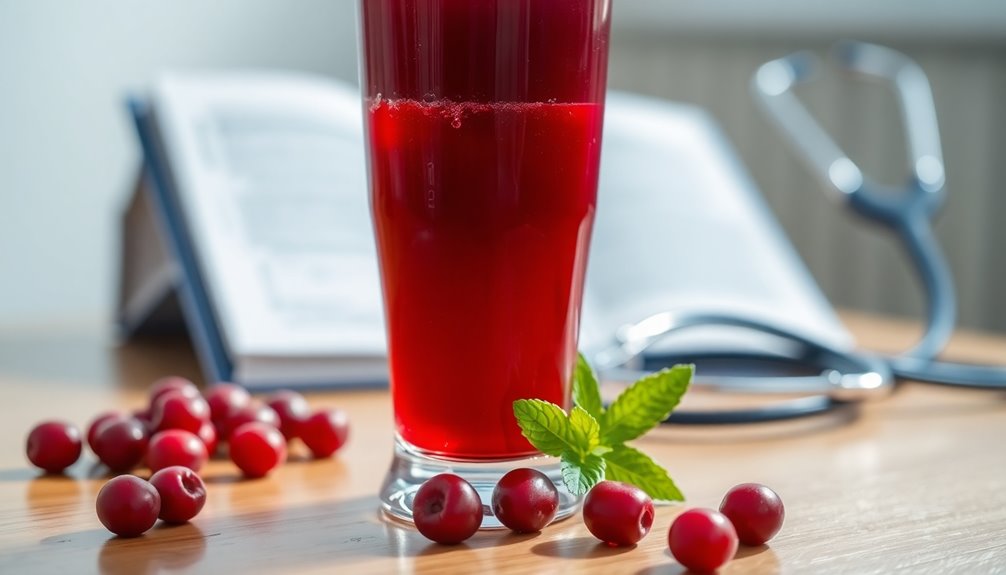
When you think about diuretics, it's important to understand that they're substances that help your body get rid of excess water and salts. They work primarily by inhibiting sodium reabsorption in the kidneys, leading to increased urine production.
While pharmaceutical diuretics effectively treat conditions like hypertension and edema, natural diuretics, such as dandelion and parsley, can also promote similar effects, though their effectiveness varies.
However, you should consult a healthcare provider before using any diuretics, as excessive use can lead to serious health issues, including electrolyte imbalances and dehydration.
It's vital to monitor your health closely when considering diuretics, whether they're natural or synthetic, to avoid potential complications.
The Role of Cranberry Juice in Urinary Health

Cranberry juice has gained attention for its potential benefits in promoting urinary health. Many people believe that the health benefits of cranberry can help prevent UTIs, thanks to compounds in cranberries that contain proanthocyanidins. These may prevent bacteria, particularly E. coli, from sticking to the urinary tract lining.
While some studies suggest cranberry juice might lower UTI incidence, it's crucial to note that it's not effective for treating active infections; antibiotics remain the gold standard.
Additionally, though cranberry juice has antibacterial properties, healthcare professionals often don't recommend it for UTI prevention due to insufficient evidence. More research is needed to fully understand how cranberry juice affects urinary health and its effectiveness against urinary tract infections.
Antioxidants in Cranberries: Benefits Beyond Diuresis
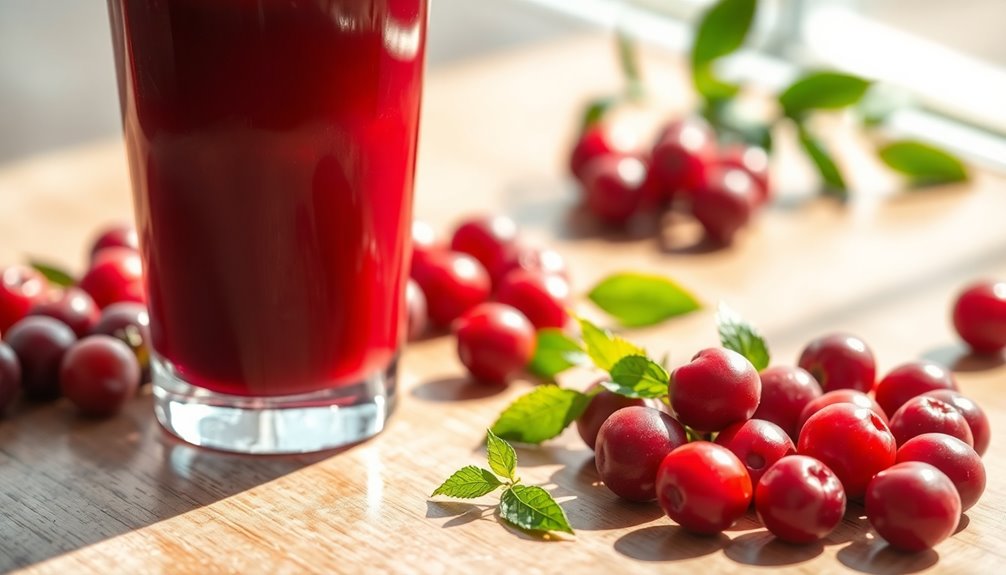
Cranberries pack a powerful punch with their rich antioxidant content, including vitamin C and quercetin. These antioxidants help protect your cells from damage and may offer health benefits beyond just supporting urinary health. Additionally, cranberries are linked to reduced risk of certain diseases, thanks to their high levels of beneficial compounds.
Antioxidant Properties Explained
While many people know cranberries for their potential diuretic effects, their antioxidant properties offer a range of health benefits that shouldn't be overlooked.
Cranberries are packed with antioxidants like vitamin C, vitamin E, and quercetin, which help protect your cells from damage caused by free radicals. A study from 2011 showed that lower pH levels in cranberries enhance their antioxidant activity, making them more effective against oxidative stress.
These properties may lower your risk of chronic diseases, including heart disease and certain cancers. Plus, regular consumption of cranberry juice can improve your heart health by reducing low-density lipoprotein (LDL) cholesterol.
Antioxidants in cranberries also support digestive health by inhibiting harmful bacteria like Helicobacter pylori.
Health Benefits Overview
Although often recognized for their diuretic effects, the health benefits of cranberries extend well beyond that single aspect.
Cranberry juice is packed with antioxidants like vitamin C, vitamin E, and quercetin, which protect your cells from oxidative damage. Regularly drinking cranberry juice can also improve heart health by lowering LDL cholesterol and reducing arterial stiffness.
Plus, if you're prone to UTIs, the phytochemicals in cranberries may help inhibit harmful bacteria like Helicobacter pylori, promoting better digestive health.
For maximum antioxidant benefits, consider consuming whole cranberries rather than just juice. By incorporating cranberries into your diet, you're not only supporting urinary health but also boosting your overall health with these powerful antioxidants.
Research on Cranberry Juice and Urinary Tract Infections
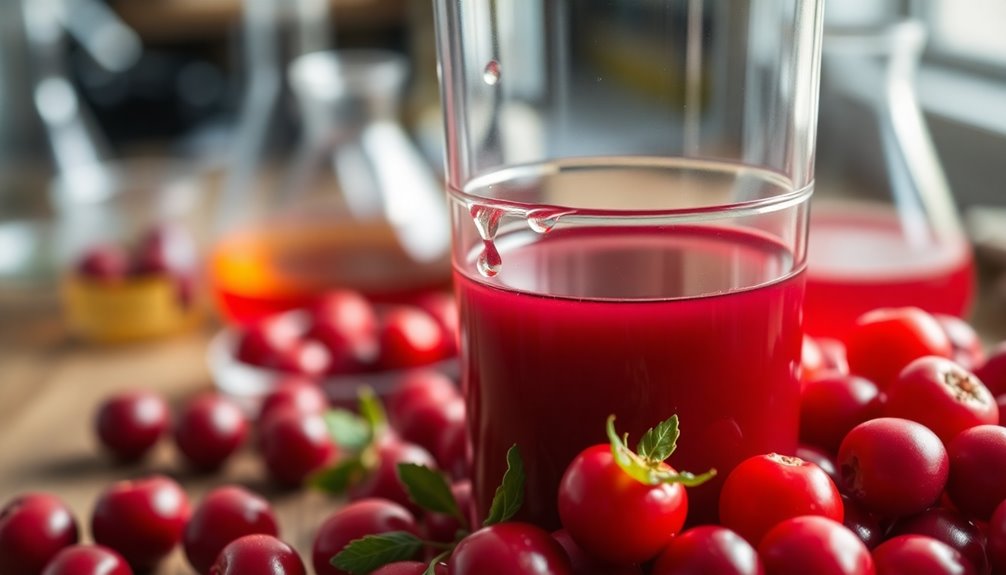
Research into cranberry juice and its potential role in preventing urinary tract infections (UTIs) has garnered significant attention, largely due to its unique compounds.
The proanthocyanidins in cranberry juice may help prevent bacteria from adhering to the urinary tract lining, potentially reducing UTI risk. Some studies have shown mixed results regarding its effectiveness, indicating that further research is needed to establish clear benefits.
A 2017 study highlighted cranberry juice's antibacterial properties, suggesting it might inhibit Escherichia coli, a primary cause of UTIs, from colonizing the bladder.
However, research involving nursing home patients consuming high-dose cranberry capsules found no significant reduction in UTI incidence.
Experts still recommend antibiotics as the gold standard for UTI treatment rather than relying solely on cranberry products for prevention.
The Connection Between Cranberry Juice and Fluid Retention
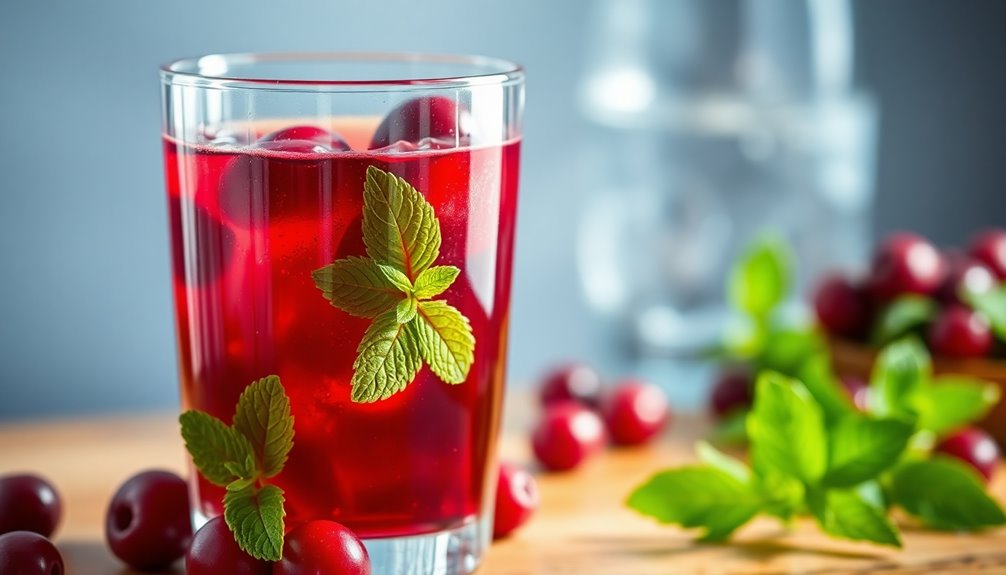
Is Cranberry Juice a Diuretic? Find Out What Science Has to Say!
The Connection Between Cranberry Juice and Fluid Retention
Have you ever wondered how cranberry juice might affect fluid retention? This popular drink contains natural diuretic properties that can promote increased urination and potentially reduce fluid retention. The proanthocyanidins in cranberry juice may help prevent bacteria from sticking to your urinary tract, supporting urinary health and fluid regulation. However, the effectiveness of cranberry juice as a diuretic can vary from person to person. Regular consumption of fluids, including those from HEPA filtration sources, can also aid in maintaining proper hydration levels and overall health.
| Component | Benefits |
|---|---|
| Proanthocyanidins | May prevent bacterial adhesion |
| Antioxidants | Support overall health |
| Vitamin C | Aids in fluid balance |
| Quercetin | Contributes to antioxidant defense |
While cranberry juice offers benefits, excessive intake, especially of sweetened varieties, can lead to increased calorie consumption, potentially causing fluid retention.
Other Natural Diuretics: a Comparison With Cranberry Juice
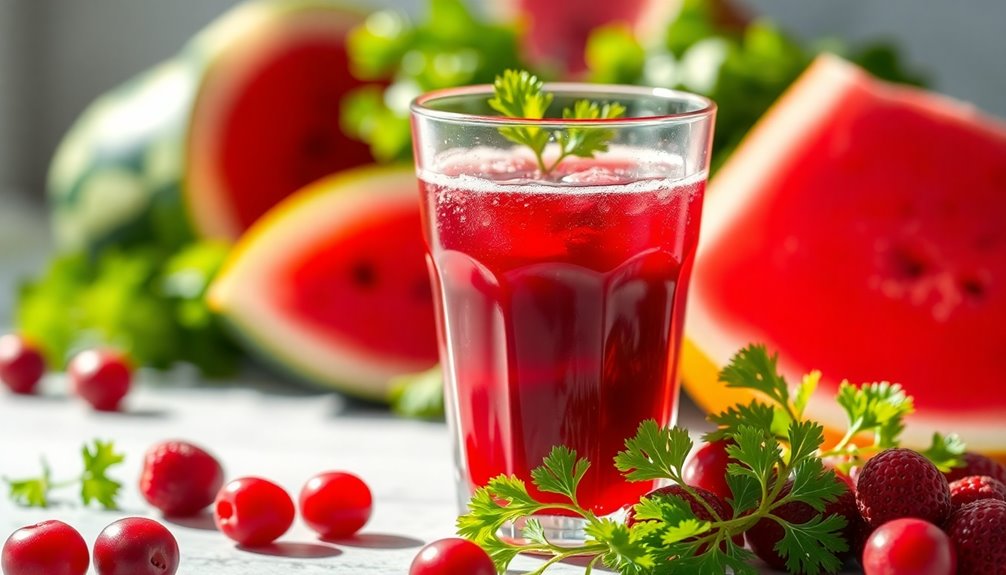
When exploring natural diuretics, you might find that cranberry juice stands out due to its antioxidant properties and unique composition. Additionally, the natural compounds found in cranberry juice can support kidney health and help flush out excess water from the body. As with any dietary choice, understanding its effects is crucial, so it’s worth noting the potential influence of cranberry juice acidity levels explained as they can impact not only its flavor but also its interaction with other dietary elements. Overall, incorporating cranberry juice into your routine could provide both hydration and health benefits in a delicious way.
While cranberry contains proanthocyanidins that help prevent bacterial attachment in the urinary tract, its diuretic effects are less pronounced compared to other options like dandelion, ginger, and parsley.
These alternatives may promote water excretion, but scientific evidence on their effectiveness is limited, and some people might find them less effective for fluid retention. Additionally, individual responses to these alternatives can vary significantly, which makes it crucial to consider personal health conditions and preferences. Furthermore, while some enthusiasts advocate for the benefits of a juice cleanse, it is essential to weigh juice cleanse benefits and drawbacks before committing to such dietary shifts. Consulting with a healthcare professional can help determine the most suitable approach for managing fluid retention effectively.
It's essential to recognize that many natural diuretics can interact with medications or worsen existing conditions, so you should consult a healthcare provider before trying them.
Potential Side Effects of Cranberry Juice

While cranberry juice is generally safe for most people, excessive consumption can lead to unwanted side effects.
Drinking large amounts may cause gastrointestinal issues like diarrhea and stomach upset due to its high acidity and sugar content. If you have a history of kidney stones, be cautious, as cranberry juice contains oxalates that could contribute to stone formation.
Additionally, it can interact with certain medications, especially anticoagulants like warfarin, increasing the risk of bleeding.
Finally, some individuals might experience allergic reactions, which can manifest as itching, hives, or swelling, particularly if they're sensitive to similar fruits.
Always consider these potential side effects when incorporating cranberry juice into your diet.
Recommended Consumption: How Much Cranberry Juice Is Beneficial?
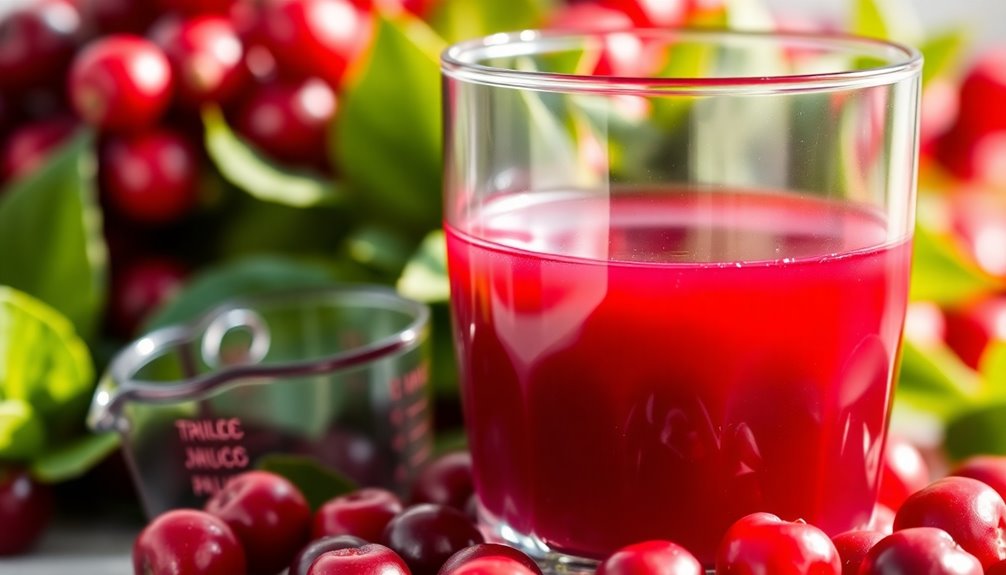
If you're considering cranberry juice for its health benefits, knowing the right amount to consume is key.
Most recommendations suggest 8 to 16 ounces daily, depending on your health goals.
However, it's important to balance these benefits with any potential risks, so consulting with a healthcare provider is a good idea. Additionally, excessive consumption can result in kidney stone formation, highlighting the need for moderation.
Daily Serving Recommendations
To reap the potential health benefits of cranberry juice, it's generally recommended you consume about 8 to 16 ounces per day. This amount helps you enjoy the juice's beneficial compounds, particularly proanthocyanidins, without excessive sugar intake.
If you're concerned about added sugars, consider low-sugar or sugar-free options. While regular consumption of cranberry juice may support urinary tract health, remember it shouldn't replace medical treatments for UTIs.
Some studies even suggest that a daily intake of up to 20 ounces may enhance the juice's effectiveness in preventing bacteria from adhering to the urinary tract lining.
Before adding cranberry juice to your routine, it's wise to consult with a healthcare provider, especially if you have existing health conditions or take medications.
Health Benefits Explained
Cranberry juice offers a range of health benefits that can be best appreciated with the right amount in your diet. Consuming about 8 to 16 ounces daily can boost your urinary tract health, thanks to its antioxidants, particularly vitamin C and proanthocyanidins. These compounds help prevent bacteria from sticking to the urinary tract lining.
While cranberry juice has some diuretic properties, it's not as potent as other natural diuretics, so it's crucial to stay hydrated. Additionally, its polyphenol content may improve heart health by lowering LDL cholesterol levels. Moreover, incorporating indexed annuities into your financial planning can provide a safeguard against inflation, ensuring that your health expenditures remain manageable over time.
To maximize these health benefits, opt for low-sugar or sugar-free cranberry juice, especially if you're mindful of caloric intake and blood sugar levels.
Potential Risks Considered
While enjoying cranberry juice can be beneficial, it's essential to reflect on potential risks associated with its consumption. Drinking about 8 ounces daily can offer health benefits, especially for your urinary tract, but moderation is key.
Excessive intake might lead to gastrointestinal discomfort or diarrhea, which no one wants. Additionally, cranberry juice contains high oxalate levels that could increase the risk of kidney stones for some individuals. If you're at risk, it's wise to consult a healthcare provider.
Also, be mindful of the sugar content; many commercial options are high in sugar. Opting for low-sugar or sugar-free versions can help you enjoy its benefits without the extra calories. Regular consumption of cranberry juice may also support urinary tract health, which can be further enhanced by incorporating other nutrient-dense foods like chia seeds into your diet.
Expert Opinions: What Do Health Professionals Say?

Although many people wonder about the diuretic properties of cranberry juice, health professionals generally view it as having only mild effects in this area.
While some studies suggest that cranberry juice can promote fluid excretion, the evidence isn't strong enough to recommend it as a diuretic treatment.
Experts stress the importance of hydration, highlighting that cranberry juice is more beneficial for its antioxidants and support for heart health.
Physicians caution against relying solely on cranberry juice for managing fluid retention. Instead, they suggest seeking medical advice and making dietary modifications for more effective solutions. Additionally, incorporating low-impact exercises can support overall health and wellness.
The Future of Cranberry Research: What Lies Ahead?

As researchers explore deeper into the potential health benefits of cranberries, exciting advancements are on the horizon.
Future studies will likely focus on cranberry juice's role in preventing urinary tract infections (UTIs), particularly through proanthocyanidins, which may inhibit harmful bacteria from sticking to the urinary tract.
While initial findings on cranberry products show mixed results, ongoing investigations aim to clarify their effectiveness.
Research may also expand into the cardiovascular benefits of cranberries, examining how antioxidants can enhance heart health.
Additionally, scientists will explore cranberries' ability to combat Helicobacter pylori and their broader impact on digestive health.
Ultimately, understanding the antimicrobial properties of cranberries could open doors to new treatments for various bacterial and viral infections.
Frequently Asked Questions
Does Cranberry Juice Act as a Diuretic?
Cranberry juice mightn't be your best bet if you're looking for a strong diuretic.
While it contains compounds like proanthocyanidins that may have mild effects, the evidence isn't solid.
Studies show it primarily helps with urinary tract health rather than greatly increasing urination.
If you're dealing with fluid retention, it's better to focus on dietary changes and consult with a healthcare provider for effective solutions instead of relying on cranberry juice.
What Happens to Your Body When You Drink Cranberry Juice Every Day?
Imagine sipping that vibrant cranberry juice every day.
What's happening inside your body? You're boosting your immune system with vitamin C, protecting your cells with powerful antioxidants, and potentially lowering your heart disease risk.
You might even be warding off urinary tract infections, thanks to proanthocyanidins.
Plus, your digestive health could improve, as cranberry juice may fight harmful bacteria.
Each glass is a step towards better overall health—how exciting is that?
Why Do Doctors Tell You to Drink Cranberry Juice?
Doctors tell you to drink cranberry juice because it may help prevent urinary tract infections (UTIs). The juice contains proanthocyanidins, which can stop bacteria from sticking to your urinary tract lining.
While it's not a substitute for antibiotics when you have an active UTI, it can be beneficial for overall urinary health.
Plus, its antioxidants, like vitamins C and E, combat oxidative stress, making it a good choice for maintaining your urinary health.
Is Too Much Cranberry Juice Bad for Your Kidneys?
Drinking too much cranberry juice can negatively impact your kidneys. While it's safe in moderation, excessive amounts might lead to kidney stones due to its high oxalate content.
You could also experience gastrointestinal discomfort, which might stress your kidneys further. If you have existing kidney issues, it's especially important to be cautious.
Always check with a healthcare provider before increasing your cranberry juice intake to avoid potential complications.
Conclusion
To sum up, cranberry juice may not be a powerful diuretic, but it certainly plays a role in promoting urinary health. Curiously, studies show that drinking cranberry juice can reduce the risk of urinary tract infections by up to 32%. So, if you're looking for a tasty way to support your urinary health, consider adding cranberry juice to your diet. Just remember to enjoy it in moderation for the best benefits!
Cindy thoroughly researches juicing trends, techniques, and recipes to provide readers with practical advice and inspiration. Her writing style is accessible, engaging, and designed to make complex concepts easy to understand. Cindy’s dedication to promoting the advantages of juicing shines through her work, empowering readers to make positive changes in their lives through the simple act of juicing.

